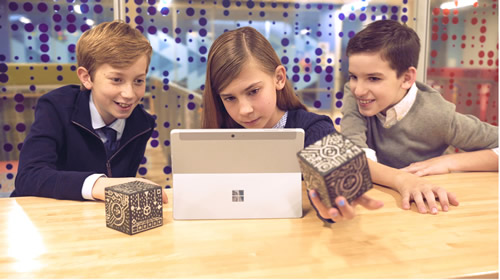Augmented reality (AR) and virtual reality (VR) are the new hot trends in education. But what does that mean and how is it going to benefit our students? AR superimposes information on our world through the use of a device; VR—a computer-generated environment in which we can interact and be immersed—is typically done with VR goggles and allows you to see a different world or space with 360-degree vision. These new tools may seem futuristic, but we are already living in the world of AR and VR.
Sometimes, technology is a cool factor. This is not a bad thing if the cool factor encourages students to follow their passion for learning or leads a student to a more innovative environment, but we need to keep technology’s instructional benefits at the forefront of our searches. Educators need to look at both AR and VR with a critical eye. We need to discover how this technology can help educate our students. We need to examine the use of this tech and know that we are not just endorsing a cool tool, but rather we are discovering new and innovative means to support our students’ learning.
The benefits of AR & VR are …?
Let’s consider some benefits of these trends. For starters, VR can totally immerse you in another location, another reality. What if we could place the students inside a cell for a science class, or on the road in ancient Rome while reading Julius Caesar? What if we could have students working in a virtual science lab using virtual chemicals that would react according to their natural elements? Talk about an experience like no other!
Related: Why our district is investing in AI, AR, VR, and MR
4 ways AR/VR can transform your lesson plan
AR appears to have gone mainstream for the first time. I’m referring to the use of augmentation in our modern world. Remember Pokémon? Millions of children (and adults) ran around their neighborhood looking for Pokémon characters. When watching football, remember seeing the yellow first-down line on the field? That is also AR.
While AR is making its way into our lives and the possibilities to use it in education are boundless, it is still a new and somewhat scary technology. Personally, I am very excited about the possibilities of using AR and VR in innovative classrooms.
5 ways you can use AR and VR in your classroom today
1. MERGE Cube: The MERGE Cube is a wonderful way to easily bring AR into your classroom. Students can turn the foam cube into a variety of artifacts by simply viewing it through their favorite device. There are several apps already written for this cube and the company is working hard to obtain free teacher-designed lessons to coincide with the apps already created. For example, one app turns the MERGE cube into the solar system. You can literally hold the solar system in your hands! Another app turns the cube into a human skull from which students can identify and remove pieces.
2. ZapWorks: ZapWorks is an AR experience creator. At first, the program comes across as a next-generation QR code. You can do a lot of QR code lessons using ZapWorks … but with a whole new twist! Using a Zapper code, you can create augmented experiences such as having a video or image float within your reality. Try it for you next tech-enabled scavenger hunt.
3. Tour Builder: Tour Builder uses Google Earth and lets students plot destinations on the globe and then load them with videos, images, and text. Next, students can share their tours and experience the movements on the VR earth. Tour Builder is great for ELA and social studies classes. Consider using it to help students who may have never traveled to better understand geographical significance. How about if, when reading about the Revolutionary War, students use it to truly understand the distance between the countries?
4. Metaverse: Metaverse gives students complete control over creating an AR scene. Through the use of various buttons and transitions, a student can create a host of projects.
5. VR Quest: This is one company that really has the student experience in mind. It is a VR environment where students can create an entire world all their own. The company has also created curriculum to go along with already created virtual worlds. There are a lot of things that are great about VR Quest, including a host of items that can be dropped into the VR world. One of this system’s greatest selling points is its ease of use; it’s ideal for students as young as kindergarten.
Related: Check out these 10 AR apps for your classroom—coding not required
There are more AR and VR products coming out all of the time. Although it may take some time to learn how to use these products—not to mention having to teach your students how to use them—I believe the benefits outweigh the burden of teacher and student training.
AR and VR are the expectations for creative and innovative learning in our classrooms. These technologies open the door to learning opportunities we are only beginning to imagine.
- 4 ways to encourage play in education - April 25, 2024
- CoSN IT Leader Spotlight: Lisa Higgins - April 25, 2024
- It’s time to pay student teachers - April 25, 2024


